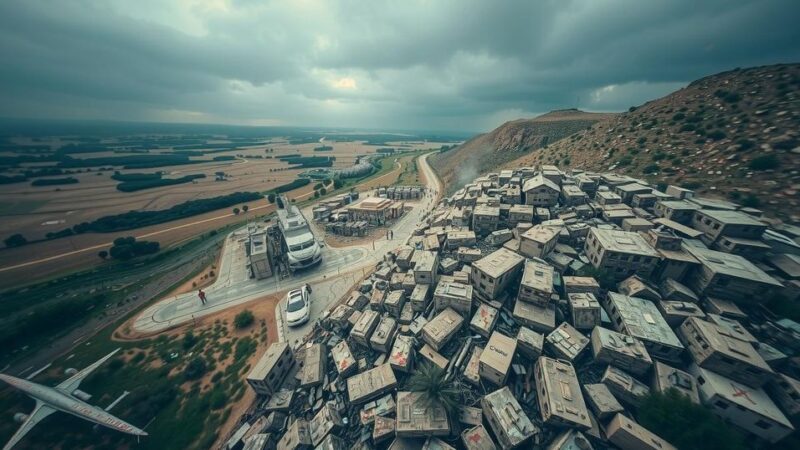The article discusses the potential for renewed U.S.-Moroccan relations under President-elect Donald Trump, who previously recognized Morocco’s sovereignty over Western Sahara. It outlines the risks posed by Iranian influence in the region and the mutual benefits of enhanced cooperation, including economic opportunities and strategic military partnerships. It emphasizes the importance of addressing the longstanding Western Sahara conflict and suggests that strengthening relations could fortify both U.S. interests and Moroccan stability.
The relationship between the United States and Morocco stands to benefit significantly from the incoming Trump administration’s approach to foreign policy. Trump’s prior recognition of Morocco’s sovereignty over Western Sahara underscores a historical opportunity to advance mutual interests. While Morocco endeavors to rekindle close ties amid shifting geopolitical dynamics, the United States must fortify this partnership to counter Iran’s encroachment in the region and seize economically beneficial prospects in a strategically vital area.
Historically, Morocco has positioned itself as a key ally to the United States in North Africa, particularly following the normalization of relations with Israel in 2020. This move was not intended as an affront to the Palestinian cause but rather as part of a broader strategy to align with nations that oppose Iranian influence. Securing military and economic cooperation from the United States could pivotally enhance Moroccan efforts to stabilize the Sahara-Mediterranean region and mitigate the risks posed by Iranian-backed separatist groups. Recent unrest and escalated tension could escalate further without renewed support from Washington.
The Biden administration’s cautious approach to Morocco, intertwining U.S. relations with Algeria, has resulted in ambiguities regarding American strategic commitments. Such posturing risks enabling Iran’s regional aspirations, strengthening its proxies, and extending its foothold in North Africa. A critical reevaluation and revitalization of U.S.-Moroccan relations is essential to curbing these dynamics while fostering economic ties, such as investments in the Atlantic Initiative in Morocco aimed at providing landlocked Sahel states with access to trade routes on the Atlantic.
Internationally, Morocco has garnered support, especially from key allies including France and Spain, aiding its position against Iranian expansionism and detrimental regional influences. The potential shift in U.S. policy under a new administration could be pivotal in changing the trajectory of the stagnant Western Sahara conflict. An explicit endorsement of Morocco’s autonomy proposal could give it renewed momentum while disengaging the U.S. from ineffective strategies, such as those previously undertaken under the United Nations. The situation demands attention, particularly as the unresolved issues surrounding Western Sahara continue to pose challenges to stability across the region.
The implications of strengthening ties with Morocco extend beyond security; they also involve significant economic opportunities for U.S. businesses. The potential relocation of U.S. Africa Command to Morocco can further cement military collaboration, positioning the United States to effectively address security challenges while enhancing its influence. In doing so, the U.S. could effectively deter Iranian ambitions in the region while enabling Morocco to facilitate safe passage of trade and migration within a historically volatile zone.
In conclusion, while the Western Sahara remains a complex and nuanced conflict, bolstering U.S.-Moroccan relations can yield multifaceted benefits. The new administration is presented with an opportunity to recalibrate its stance, promoting enduring partnerships that not only solidify Morocco’s regional influence but also sustain U.S. national interests in a strategically vital area through enhanced diplomacy, security, and economic collaboration.
Since its independence, Morocco has actively sought to affirm its sovereignty over Western Sahara, a territory it has administered since Spain’s withdrawal. The pro-independence Polisario Front, backed primarily by Algeria and Iran, has long contested this claim, creating a geopolitical rift within the region. U.S. foreign policy has traditionally focused on balancing support for Morocco against the necessity of maintaining regional stability, especially with respect to Algeria’s interests in the area. Past administrations have struggled to navigate this complexity, leading to fluctuating degrees of support and recognition for Morocco’s territorial claims amid ongoing tensions. The recent normalization of relations between Morocco and Israel has added a new layer to this geopolitical landscape, prompting concerns over Iran’s potential influence through proxy groups operating in the disputed territory and beyond.
In summary, the incoming Trump administration’s approach presents an essential opportunity to reaffirm and deepen U.S.-Moroccan relations in the face of Iranian ambitions and regional instability. Strategic partnerships and investments can yield significant benefits while addressing the long-standing issues surrounding Western Sahara. By embracing Morocco’s autonomy proposal and actively engaging in economic and military cooperation, the United States can deter adversarial actions from Iranian proxies and bolster regional security.
Original Source: www.atlanticcouncil.org




